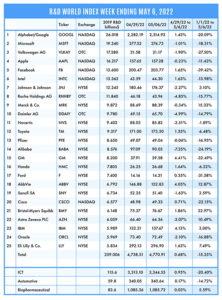
The R&D World Index (RDWI) for the week ending May 6, 2022, closed at 4,770.91 for the 25 companies in the RDWI. The Index was up 0.68% (or 32.40 basis points) from the week ending April 29, 2022. Twelve of the 25 RDWI members gained value from 0.35% (Ford Motor) to 4.41% (General Motors). Thirteen of the 25 RDWI members lost value from -0.06% (Pfizer) to -7.25% (Alibaba).
Boeing Co., Chicago, announced last week that it was moving its corporate headquarters from Chicago to Arlington, Virginia, supposedly to be closer to top federal officials and regulators. The company also said that it would establish an R&D hub in northern Virginia which would focus on cybersecurity, autonomous operations and systems engineering. Boeing moved its headquarters from Seattle to Chicago in 2001. The company said it would maintain a presence in Chicago but declined details. Boeing invested about $3.2 billion in R&D in 2020. In a separate announcement, Boeing rival Airbus SE, Leiden, The Netherlands, announced last week that it plans to build a second assembly line at its Mobile, Alabama, commercial jet factory to increase production of its A320 single aisle airliner. This would increase its A320 production rate to 65 airliners/month by summer, 2023. Airbus SE invested about $2.5 billion in R&D in 2020.
As expected by most analysts, the U.S. Federal Reserve raised short term interest rates by 0.5% to a range of 0.75% to 1.0% at its regularly scheduled meeting last week. Fed chairman Jerome Powell stated in their meeting that additional half-point interest rate increases could be warranted at their June and July meetings given current economic conditions. Inflation is much too high, said Powell in his remarks and they expect to raise interest rates to near 2.0% by December in an attempt to slow inflation’s continued rise. Government borrowing to combat the pandemic and the Russia-Ukraine war are two of the primary reasons for the rapid rise in inflation, according to the Fed.
RDW Index member, Intel, announced last week, that its subsidiary Intel Federal was awarded a contract to develop advanced simulation solutions for off-road autonomous ground vehicles. The company said that Intel Labs will work in partnership with the Computer Vision Center, Barcelona, Spain, and the University of Texas at Austin. Intel’s RACER-Sim (for Robotic Autonomy in Complex Environments with Resiliency – Simulation) program is targeting development of a system to reduce the development cost and time between simulations and the real world. Intel has advanced autonomous driving through the CARLA (CAR Learning to Act) simulator. Intel states that the gap between autonomous on-road and off-road software deployment is significant and few existing on-road systems are optimized for off-road environments at scale and speed.
Amazon, Seattle, announced last week that it has a new $1 billion venture fund for investing in companies working in the customer fulfillment, logistics and supply chain sectors. The Amazon Industrial Innovation Fund is the result of record venture investments in the shipping and logistics management space prompted by massive problems in the global supply chains. Amazon said its new fund will focus on companies across all stages from early-stage startups to more established companies. The fund has already invested in Agility Robotics, Albany, Oregon; BionicHIVE, Israel; and Mantis Robotics, San Francisco.
The U.S. Food and Drug Administration (FDA) last week limited the use of the COVID-19 vaccine from RDW Index member Johnson & Johnson, New Brunswick, New Jersey, after reviewing the risk of life-threatening blood clots. The FDA stated that the J&J vaccine is only available for adults for whom other vaccines are not available or medically appropriate. About 17 million Americans have received the J&J vaccine. Part of the restriction in use is due to scientists still not knowing what contributes to the risk factors. Sixty cases and nine deaths have been attributed to these events.
The FDA last week also rejected the applications of cancer drugs from Hong Kong’s Hutchmed Ltd. and Shanghai Junshi Biosciences. Both drugs are approved in China. The FDA asked both companies to change a quality-related process for the drugs, which the companies said was easily addressable and they plan to resubmit their applications by midsummer.
Biogen, Cambridge, Massachusetts, announced last week that it plans to abandon its high-profile Alzheimer’s disease treatment, Aduhelm, following Medicare’s refusal to pay for the drug (approximately $28,200 annual price tag).
Approved COVID-19 vaccine developer Moderna, Cambridge, Massachusetts, last week filed a motion to dismiss some of the patent infringement claims in a lawsuit filed against the company by Arbutus Biopharma Corp., Warminster, Pennsylvania, and Genevant Sciences, GmbH, Germany. The claimants state that the Moderna vaccine has components covered by their patents and they are now seeking royalties from Moderna’s vaccine. Moderna states that they do not infringe those patents and that it uses its own proprietary lipid nanoparticle technology.
The U.S. National Oceanic and Atmospheric Administration’s (NOAA’s) observatory on Hawaii’s Mauna Loa volcano last week announced that the level of carbon dioxide in the atmosphere reach an all-time high of 420 parts per million in April, eclipsing its 419 ppm reading in May 2021.
Deliveries of semiconductor chip-making equipment is taking significantly longer than expected, according to chip executives, exacerbating relief from the current chip shortages. The rash of equipment orders has now delayed deliveries by up to two years. Chip shortages will now last into 2023 and 2024 according to a report last week in the Wall Street Journal.
R&D World’s R&D Index is a weekly stock market summary of the top international companies involved in R&D. The top 25 industrial R&D spenders in 2019 were selected based on the latest listings from Schonfeld & Associates’ June 2020 R&D Ratios & Budgets. These 25 companies include pharmaceutical (10 companies), automotive (6 companies) and ICT (9 companies) who invested a cumulative total of nearly 260 billion dollars in R&D in 2019, or approximately 10% of all the R&D spent in the world by government, industries and academia combined, according to R&D World’s 2021 Global R&D Funding Forecast. The stock prices used in the R&D World Index are tabulated from NASDAQ, NYSE, and OTC common stock prices for the companies selected at the close of stock trading business on the Friday preceding the online publication of the R&D World Index.



Tell Us What You Think!